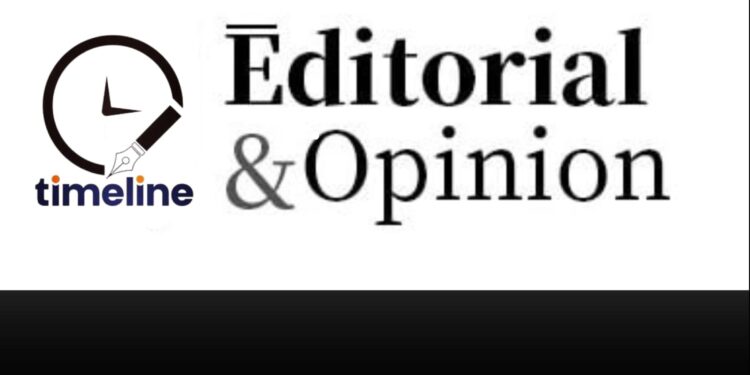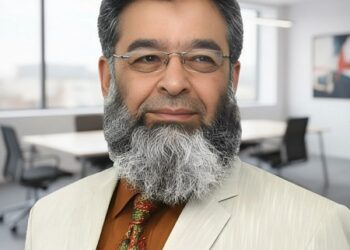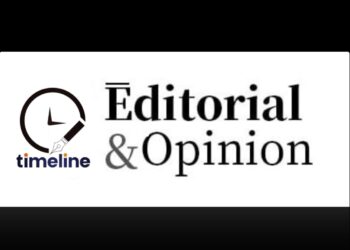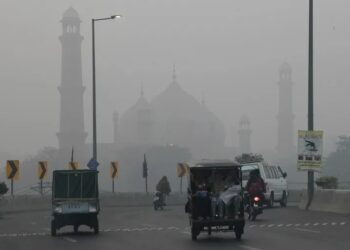Written by: Abdul Basit Alvi
As future voters and potential leaders, students play a significant role in shaping Pakistan’s political future. The ability to make informed, independent decisions is fundamental for a healthy democracy. By rejecting propaganda, students can become more politically mature, engaging with issues based on reason, evidence, and fairness, rather than emotional manipulation or partisan bias. One of the most dangerous outcomes of propaganda is its capacity to divide society along political, ethnic, or religious lines. In a country as culturally and religiously diverse as Pakistan, propaganda can heighten sectarian tensions, fuel ethnic divisions, and spark social unrest. Students who resist these tactics can help build a more inclusive, respectful, and tolerant society. Propaganda often exploits these differences, promoting “us versus them” narratives that target specific ethnic or religious groups with stereotypes or misinformation. By avoiding such propaganda, students can contribute to a society that values diversity and unity. In particular, when propaganda is used to inflame religious tensions, it can lead to sectarian violence and discrimination—something that students can help prevent by steering clear of divisive material. By rejecting biased narratives, Pakistani students can play a crucial role in fostering peaceful coexistence and promoting interfaith harmony within their communities. In academic environments, students are encouraged to engage with information in a critical and constructive manner. Propaganda, by its very nature, distorts facts and promotes biased thinking, which undermines the educational process. For Pakistani students, who are still developing their knowledge and skills, it is essential to distinguish between genuine academic exploration and manipulative propaganda. Propaganda can permeate educational resources, whether in textbooks, media content, or online materials. If students depend on these biased sources, their understanding of subjects may become distorted, negatively impacting both their academic performance and intellectual development. By steering clear of propaganda, students can ensure they are honing their critical thinking and analytical abilities in a more objective and unbiased environment. Propaganda often stifles independent thought by promoting conformity and adherence to a specific ideology. In contrast, academic settings thrive on open discussion, critical analysis, and the free exchange of ideas. Students who avoid propaganda are more likely to engage in independent research, question established beliefs, and form their own well-informed views.
Misinformation is a global issue, and Pakistan is no exception. With the rise of social media, students are inundated with information from all directions. Much of this content may be exaggerated, misleading, or completely false, created to serve particular interests. Misinformation and fake news can have far-reaching consequences, from swaying elections to inciting violence. In today’s digital age, one of the most crucial skills for students is media literacy—the ability to assess the credibility of sources and identify fake news. Propaganda, often disguised as news, spreads easily through social media and other platforms. Students who develop the ability to critically evaluate information can protect themselves from falling for misinformation and help others in their community do the same.
False information spread through propaganda can have immediate and damaging effects, such as inciting violence, spreading hatred, or causing panic. For example, misleading information about a community or political leader can escalate tensions, leading to violence and social unrest. By avoiding propaganda, students can help prevent these harmful outcomes and contribute to a more peaceful and stable society. Ultimately, the future of Pakistan relies on its youth—students who will shape the nation’s future. Propaganda can distract young people from addressing real issues and prevent them from focusing on the vital task of nation-building. When students are sidetracked by biased or manipulated information, they are less likely to participate in meaningful activities that contribute to national progress. Pakistan faces numerous challenges, from economic struggles to issues in education, healthcare, and infrastructure. These challenges require the collective efforts of all citizens, especially students, to address.
By avoiding propaganda, students can engage in constructive discussions about how to solve these problems and help create a brighter future for the country. The key to overcoming Pakistan’s challenges lies in national unity and collective action. Propaganda, with its divisive methods, obstructs this effort by fostering factions and sowing discord. Students who stay away from propaganda are better equipped to contribute to the teamwork necessary to achieve national progress, promoting unity and collaboration for the greater good. Avoiding propaganda requires active effort and a critical approach to the information students encounter. Pakistani students should cultivate the habit of questioning the sources they come across. Is the information supported by credible evidence? Is it from a reputable source? Are there alternative perspectives that should be considered? Students can verify information by using reliable fact-checking tools and websites to confirm its authenticity before sharing it with others. Engaging in conversations with peers and mentors allows students to gain insights from various perspectives, helping them question biased narratives and develop a more well-rounded worldview. Pakistani students, in particular, can take an active role in educating their peers and communities about the risks of propaganda, encouraging critical thinking when engaging with information.
Pakistan, situated in South Asia, holds significant importance in both regional and global geopolitics. With its rich history, strategic location, and diverse population, the country is a key player in international relations, security issues, and economic progress. One of the key pillars of the nation is its military, the Pakistan Armed Forces. As the largest branch of the military, the Pakistan Army has historically been central to safeguarding the country’s sovereignty, securing its borders, and maintaining internal stability. However, like many other nations, both Pakistan and its military have frequently been targeted by propaganda. When used maliciously, propaganda can distort public perception, create divisions, and even threaten national security.
Pakistan occupies a crucial geopolitical position, serving as a link between the Middle East, Central Asia, and South Asia. It shares borders with major regional powers like India, Afghanistan, Iran, and China, making it a significant player in global trade, especially given its proximity to vital energy routes in the Middle East and its access to the Arabian Sea. Despite its challenges, Pakistan has considerable economic potential. With a growing population, a thriving agricultural sector, expanding industries, and a developing tech industry, the country is poised to become a regional economic powerhouse. Its involvement in initiatives like the China-Pakistan Economic Corridor (CPEC) underscores its increasing influence in shaping regional economic trends.
Due to its proximity to conflict-prone areas like Afghanistan and its ongoing tensions with India, Pakistan has long faced security issues. Ensuring the nation’s security and stability remains a top priority for both its government and military, especially given the ongoing threats posed by terrorism and insurgency.
Pakistan has also maintained a significant diplomatic role, particularly within the Muslim world, and is a member of several international organizations, such as the United Nations, the Organization of Islamic Cooperation (OIC), and the South Asian Association for Regional Cooperation (SAARC). Its strong diplomatic ties with major global powers, especially China and the United States, further enhance its global standing.
The primary mission of the Pakistan Army is to protect the nation’s sovereignty and territorial integrity. With a long-standing and often contentious border with India, the army is tasked with ensuring the security of Pakistan’s borders from external threats. Additionally, the armed forces have played a crucial role in tackling internal security challenges, including conducting counterinsurgency operations in areas such as Balochistan and Khyber Pakhtunkhwa. The Pakistan Army has been at the forefront of the country’s battle against terrorism, particularly since the U.S. invasion of Afghanistan in 2001. Military operations like Operation Zarb-e-Azb have significantly weakened terrorist groups operating within the country.
Beyond military operations, the Pakistan Army is also involved in national development and humanitarian efforts. It has played an important role in disaster response during natural disasters such as earthquakes and floods. Moreover, the army contributes to infrastructure development in remote areas, particularly those affected by conflict or natural calamities. Additionally, the Pakistan Army has been engaged in peacekeeping missions under the United Nations. Pakistani soldiers have participated in peacekeeping missions in conflict zones like Somalia, Rwanda, and Sierra Leone, strengthening Pakistan’s global reputation as a force for peace. The Pakistan Army has gained the respect of the nation through its professionalism, sacrifices, and steadfast dedication to the country. It continues to be a symbol of national pride and resilience. The army’s sacrifices in defending Pakistan’s sovereignty and upholding peace have been vital in promoting a sense of unity and patriotism among the people of Pakistan. Propaganda aimed at undermining Pakistan or its military has profound implications for national security, public opinion, and international relations. In today’s era of social media and widespread misinformation, the effects of such propaganda are especially significant.
Propaganda that portrays Pakistan or its military negatively can erode national unity and morale. As the protector of Pakistan’s sovereignty, the military holds a special place in the hearts of citizens. Spreading false narratives or creating divisions about the army can foster distrust, deepen internal rifts, and weaken the nation’s resolve during times of conflict or crisis. Misinformation or distorted portrayals of the military’s operations or policies can polarize public opinion, turning parts of the population against the armed forces. In moments of national emergency, this division can greatly hinder Pakistan’s ability to present a united front against external threats.
The credibility of the Pakistan Army is built on its role as the country’s protector. Propaganda that falsely accuses the military of human rights violations, corruption, or mismanagement can erode public trust, making it harder for the army to operate effectively at home and abroad.
Propaganda targeting Pakistan or its military can also have serious repercussions on the country’s international standing. Global media, particularly in conflict zones, can be easily influenced to spread biased or distorted narratives about Pakistan. When these narratives gain traction, they can damage Pakistan’s diplomatic ties and tarnish its image as a peaceful and responsible nation. False or malicious propaganda can strain relations with other countries, especially if they begin to believe misleading stories circulated by hostile media or social media campaigns. For example, baseless claims of Pakistan’s involvement in terrorism or support for extremist groups could lead to diplomatic isolation or sanctions. The international community often relies on media portrayals to evaluate a country’s stability and credibility. Propaganda against Pakistan’s military, security institutions, or government can result in foreign policy decisions that isolate or penalize Pakistan based on false perceptions, making the country more vulnerable to external pressure.
One of the key objectives of propaganda targeting the Pakistan Army is to weaken the country’s defense capabilities. When the military is discredited or its actions misrepresented, both domestically and internationally, it becomes harder to maintain military morale and secure support for defense initiatives. Attacks on the army’s reputation or the misrepresentation of its operations can lead to lower recruitment, diminished morale, and reduced funding for defense programs. The Pakistan Army depends on strong national support to remain prepared and capable of responding to security challenges both within the country and abroad. Effective military operations require coordination, funding, and public backing. Propaganda that undermines these efforts creates vulnerabilities, leaving Pakistan exposed to external threats. A fractured domestic front complicates the development of cohesive strategies in the face of external challenges. Historically, Pakistan’s adversaries, both regional and global, have used propaganda to exploit internal weaknesses. By manipulating public opinion and amplifying existing grievances, external powers can destabilize Pakistan’s political system, weaken its military, and incite unrest. Pakistan’s adversaries, especially India, have frequently employed propaganda to heighten existing tensions between the two nations. Media campaigns that falsely accuse Pakistan of supporting terrorism or breaching international agreements can foster an environment of hostility and distrust, complicating efforts to resolve conflicts. In today’s digital age, cyber warfare and information warfare are increasingly being used to target both military and civilian infrastructure. Propaganda campaigns, whether initiated by state actors or non-state entities, aim to destabilize Pakistan by spreading false narratives and deepening divisions within the country.
Lieutenant General Ahmed Sharif Chaudhry, Director General of Inter-Services Public Relations (ISPR), has been particularly vocal about the dangers of misinformation and propaganda. He has repeatedly urged the youth to avoid falling prey to it during his interactions with students and young people. Recognizing the significance of this issue, he is deeply committed to encouraging the youth to focus on positivity and refrain from negative influences. Recently, during a visit to the University of Management and Technology (UMT), he met with the senior management, praising the university’s educational efforts. DG ISPR also held an interactive session with UMT students, faculty, and staff, where he discussed the vital role of the Pakistan Army in safeguarding the country’s sovereignty and fostering its progress. He reaffirmed that the Pakistan Army is always prepared to defend the nation’s borders and remains determined to eliminate terrorism completely.
In his address, Lt Gen Ahmed Sharif Chaudhry urged students to avoid engaging with negative propaganda, embrace their true identities, and contribute positively to Pakistan’s development. He emphasized that the Pakistan Army’s core mission is the defense and survival of Pakistan, a commitment that will never waver. “We will confront anti-state elements with unwavering resolve and firmly respond to any hostile intentions towards our sacred land,” stated DG ISPR. During the Q&A session, students raised a variety of questions, and Lt Gen Chaudhry provided insightful and factual answers, enlightening the younger generation. The students praised the Pakistan Army’s efforts and expressed a desire for more such sessions to bridge the gap between the youth and the military, clearing up misunderstandings. DG ISPR further assured that there should be no doubt about the unwavering support of Pakistan’s youth, particularly students, in standing by the Pakistan Army to protect the country. This support will play a crucial role in securing a brighter future for the nation. DG ISPR’s engagement with young people has had a positive impact and significantly reduced misinformation. Under his dynamic leadership, the ISPR has effectively tackled this challenge.
In today’s interconnected world, social media has become a dominant platform for communication, information sharing, and influencing public opinion. While social media offers many advantages, it also presents significant challenges, particularly regarding misinformation and propaganda. Like many nations, Pakistan is facing the harmful effects of negative propaganda, especially aimed at its military, the Pakistan Army. These campaigns, often driven by external actors or hostile forces, can damage the country’s reputation, national security, and unity. In response, Pakistan and the Pakistan Army have taken proactive measures to counteract propaganda, bolster national security, and protect the integrity of the armed forces. The Pakistan Army’s public relations wing, the Inter-Services Public Relations (ISPR), has been at the forefront of these efforts to combat misinformation. Acknowledging the increasing impact of social media and the swift spread of misinformation, the ISPR created the Digital Media Wing (DMW) to effectively manage its online presence. The main goal of the DMW is to foster a positive narrative about the Pakistan Army while countering false narratives and negative propaganda. The DMW operates on various social media platforms, including Facebook, X, YouTube, and Instagram, to engage with the public and provide accurate information. Through the DMW, the Pakistan Army has been able to swiftly and effectively address defamatory content and propaganda in real-time. By countering false claims with verified facts, the DMW plays a vital role in shaping public perception and safeguarding the military’s image. Recognizing the growing influence of social media as a tool for engaging both domestic and international audiences, the Pakistan Army has worked to strengthen its presence on platforms such as X, Facebook, and Instagram. To counteract false narratives, the ISPR has launched various social media campaigns that highlight the positive contributions of the Pakistan Army in areas such as counterterrorism, humanitarian aid, and national defense. These campaigns emphasize the military’s role in ensuring Pakistan’s safety and security.
Beyond military operations, the army’s involvement in disaster relief efforts, such as responding to earthquakes and floods, has been prominently showcased in its online communications. By emphasizing its humanitarian efforts, the Pakistan Army combats negative portrayals and fosters a stronger connection with the public. The Pakistani government and military recognize the pivotal role media plays in shaping public opinion. As part of their strategy to counter propaganda, they have worked closely with both local and international media outlets to promote truth and counter false narratives. Pakistan’s media outlets collaborate with the ISPR to ensure military operations and national security initiatives are reported accurately and transparently. Through press releases, interviews, and media briefings, the ISPR provides journalists with factual information to help refute propaganda.
Pakistani government has also engaged with international media to clarify misconceptions about the country and its military. By building strong relationships with foreign journalists and providing them with accurate information, the Pakistan Army seeks to protect Pakistan’s global image and counter misleading portrayals. Real-time fact-checking has become one of the most effective tools in combating online propaganda. Pakistan’s military and government have implemented various measures to ensure the swift correction of misinformation. The ISPR collaborates with independent fact-checking organizations to verify claims made about Pakistan and its military. When false or misleading content arises on social media, fact-checking teams quickly provide evidence-based corrections. Specialized teams monitor social media platforms for signs of disinformation or harmful propaganda, tracking hashtags, keywords, and trends indicative of coordinated efforts to spread false narratives. When such content is detected, timely interventions are made to correct the narrative and highlight the truth.
To mitigate the impact of propaganda, Pakistan has enacted legal and regulatory measures to combat the spread of harmful content on social media. Robust cybersecurity laws, such as the Prevention of Electronic Crimes Act (PECA) introduced in 2016, criminalize online defamation, hate speech, and the dissemination of false information. Through these laws, the government can take legal action against individuals or groups responsible for spreading propaganda. Pakistan has also collaborated with social media platforms like Facebook, X, and YouTube to ensure that fake news and hate speech are flagged and removed. Social media companies are encouraged to comply with local laws, and Pakistan’s Federal Investigation Agency (FIA) has been empowered to take action against violators. In addition to combating social media propaganda, Pakistan has focused on enhancing its cybersecurity infrastructure. The military, along with other government agencies, has established cyber defense units responsible for safeguarding critical information and systems from malicious attacks, including those designed to spread propaganda. Influencers and public figures wield significant influence over social media audiences, and their ability to shape opinions makes them a key component of Pakistan’s strategy to counter propaganda. The Pakistan Army and government have collaborated with celebrities, influencers, and prominent public figures to promote a positive narrative about the country and its military. These influential individuals use their social media platforms to share stories about the army’s sacrifices, its role in ensuring national security, and its contributions to humanitarian efforts. The military has also partnered with popular digital creators and content producers to develop videos, posts, and articles that highlight the army’s positive impact on the country. This collaboration helps amplify the truth and challenge negative stereotypes and false narratives. A united nation is less vulnerable to divisive propaganda.
In addition to combating external propaganda, Pakistan has focused on promoting national unity to safeguard the country’s integrity. National campaigns aimed at fostering unity, pride, and patriotism have been launched to strengthen the collective spirit of the nation. These campaigns seek to unite Pakistanis across ethnic, regional, and cultural lines, making them more resilient to divisive propaganda. By highlighting the diversity of Pakistan’s population and the role of all citizens in the nation’s progress, these campaigns foster a sense of shared responsibility and resistance to foreign interference and internal disinformation. There is a widespread call from the public for the full activation of firewalls to monitor and control social media and for stricter measures to address this issue.
By integrating efforts in digital media, cybersecurity, legal enforcement, and national unity, the Pakistani government and military are taking crucial steps to tackle the threats posed by misinformation and propaganda. Through these initiatives, Pakistan aims to protect its sovereignty, maintain public trust, and ensure that its positive contributions to both national and international security are accurately portrayed. The entire nation stands behind these efforts and rejects all forms of propaganda and misinformation intended to weaken or destabilize the country.

























